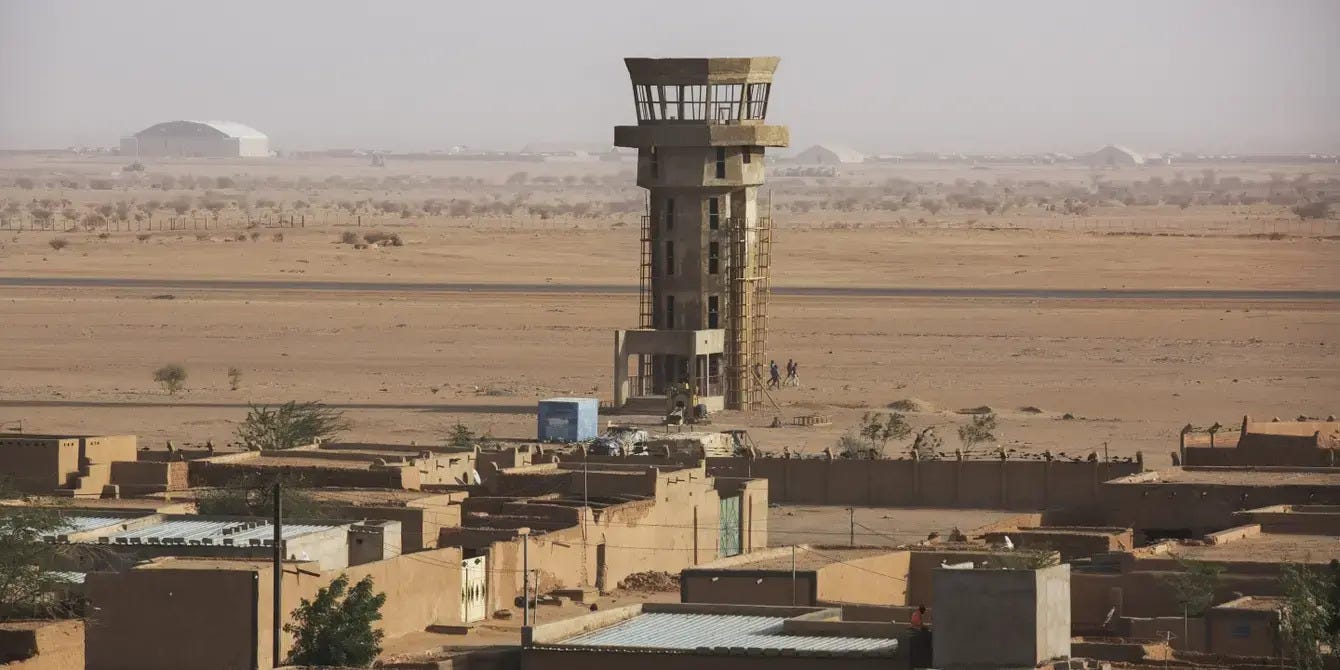Security Update : West Africa May 5th.
Chad/Niger : US withdrawal leaves the region's future in the balance.
The former US base in Agadiz, northern Niger. The loss of this facility will seriously hamper the ability of washington to operate in a region on the frontline of the fight against Al Qaeda & ISIS elements.
Image Courtesy : Joe Penney
Dwindling hopes that the US would be able to maintain its position in the Sahel despite the growth of pro Russian coups in the region were further dashed in the last week after the US formally announced that its troops would exit both Niger & Chad in the near future. In Niger over 1000 US troops are set to leave following the failure of protracted talks between Washington & the new military junta in Niamey which have been underway since ex president Bazoum was ousted in a coup last year. This is a major setback as it means losing access to the US$100m Agadiz drone base, which will seriously hamstring US counterrorism efforts in the region.
Recent threats to US forces from high ranking officials in neighbouring Chad, paint an equally grim, though still somewhat murky picture for the future of western forces in that country. .This threat and request to leave which was sent informally from a high ranking military officer and not through official diplomatic channels, comes amid an intensifying power struggle as the infamously unstable country prepares for upcoming elections in early May..
The current incumbent .Mahamat Idriss Déby Itno, who assumed power following the death of his father the former leader Idriss Déby in April of 2021, has in recent months recently instituted a severe crackdown on opposition figures, going so far as to see to the extrajudicial execution of his cousin,Yaya Dillo, the former leader of the opposition Parti Socialistes sans Frontieres. US officials have stated that they hope to return to the country once the situation has stabilised after the elections this coming week.
At this time it still remains uncertain whether threats to US forces are a negotiation tactic employed by the regime in a time when they know that Washington is desperate to maintain a regional foothold or an attempt by a pro Russian faction to isolate N’dajema from possible aid and institute a regime change. The latter is not an unlikely prospect as Wagner forces have a presence in both Libya & the CAR where Chadian rebel forces hostile to the current regime are known to operate. With both French & US forces in the region on the back foot and deprived of their bases they would now find it far more difficult to intervene as they have previously done in the past during the tenure of Idriss Déby.
Togo : Ruling incumbent clings on to power, but at what cost?
New rules would see the longtime ruler of Togo extend his rule to 2030.
Image Courtesy : USafricalive.
As the West’s hold on the West African region continues to slip, it will have to pivot hard towards shoring up its relationships with its remaining allies in the coastal states and do what it can to ensure that local governments avoid the pitfalls which struck the previous incumbents in what is now referred to as the coup belt. Such a task is however easier said than done, as religious and cultural rifts, ineffective and corrupt governments and acute cost of living crises in the wake of Ukraine related supply shocks have left local populations longing for alternatives.
Over the last week,a legislative vote in the small west african state of Togo served to vividly illustrate the crisis of legitimacy in local democracies. The vote has seen longtime President Faure Gnassingbé win overwhelming approval to pass new constitutional reforms that will allow him to skirt presidential term limits and continue ruling the country under a new moniker, the so called “President of the council of ministers” Such flagrant abuses of power are sadly nothing new for Togo however. As Gnassingbé is merely the scion of a political dynasty which has ruled the country unopposed since the early 1970’s.
Local opposition parties have rejected the results, asserting voting irregularities and promising to take up their case with regional ECOWAS courts.However this is likely to achieve little. Past experience in Gabon , Senegal and elsewhere has demonstrated that while regional leaders are prepared to diplomatically isolate military coup leaders, they have no compunctions about closing ranks around ruling incumbents who perform “constitutional coups” to extend their terms in power.
While such hypocrisy has allowed Gnassingbé to secure another term in power it may yet still come at a serious cost...While in previous years the government could count on the countries security forces to keep internal dissent in check, the situation in the Sahel means that they and their other regional compatriots now face a much more serious threat - that of incursions by battle hardened islamists along their northern border. Facing down this danger is a society beset by chronic poverty,underdevelopment and a marginalized muslim minority already overrepresented in opposition protest movements. Should the state attempt to rally support to its side against growing local radicalism, it may yet find that its appeals in favour of democracy, and the protection of law and order fall on increasingly deaf ears.




